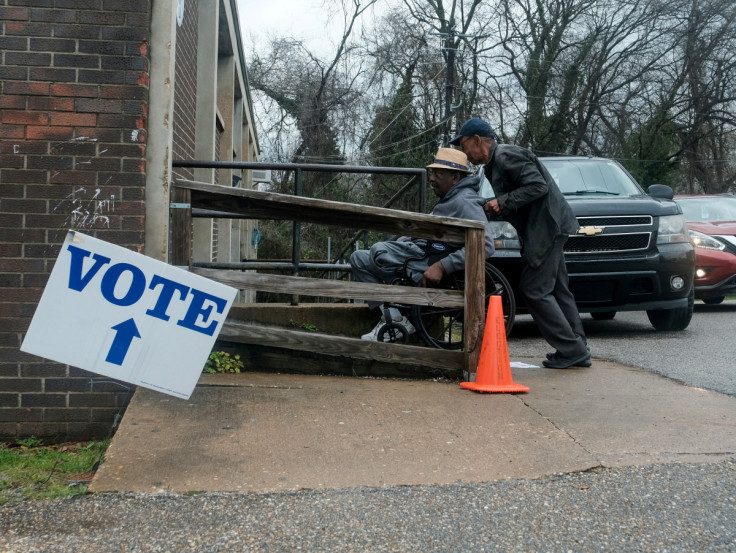Voting Rights Act Survives At US Supreme Court But More Challenges Loom

The U.S. Supreme Court has granted an unexpected reprieve to a landmark law barring racial discrimination in voting after rolling back its protections over the past decade, but more challenges to the Voting Rights Act seem certain based on actions by Republican legislators in numerous states.
Conservative Justices John Roberts and Brett Kavanaugh joined the court's three liberals in a 5-4 ruling on Thursday that declared that a Republican-drawn electoral map in Alabama weakened the clout of Black voters in violation of the Voting Rights Act. The court's conservatives in two prior rulings since 2013 had rolled back protections under that 1965 law.
Election law expert Ned Foley of Ohio State University's Moritz College of Law called the ruling "a hugely important development for both the Voting Rights Act and the Supreme Court more broadly."
"It shows that Roberts and Kavanaugh are open to moderation in some key cases, whereas the four others to their right aren't," Foley said, referring to conservative Justices Samuel Alito, Clarence Thomas, Amy Coney Barrett and Neil Gorsuch.
The decision requires Alabama to draw a second U.S. House of Representatives district where Black voters comprise a majority or close to it. In the invalidated map, six House districts in Alabama were white-majority - and just one Black majority - despite Black people comprising 27% of the state's population.
"It was not just a win for Alabama, it was a win for democracy itself," Representative Terri Sewell, the lone Black House Democrat from Alabama, told reporters.
Electoral districts are redrawn each decade - a process called redistricting - to reflect population changes as measured by a national census.
Thursday's ruling could have implications for other legal challenges to Republican-drawn electoral maps. Marc Elias, a Democratic elections lawyer, said it likely means litigation challenging a Louisiana congressional map can move forward.
The Supreme Court last year reinstated a Republican-drawn map of Louisiana's six U.S. House districts that had been blocked by a judge who found it likely discriminated against Black voters. The Supreme Court similarly last year allowed Alabama's map to be in effect for the November 2022 congressional elections, only to strike it down on Thursday.
The plaintiffs in Louisiana said in their lawsuit that the Republican-drawn map maximizes "political power for white citizens" by packing large numbers of Black voters into a single district and dispersing the rest into the five others where they are too few to elect their preferred candidates.
"Louisiana's situation directly mirrors Alabama's," Elias said.
The Voting Rights Act was passed at a time when Southern states including Alabama enforced policies blocking Black people from casting ballots. Nearly six decades later, the Supreme Court continues to hear cases involving Black voters suing over electoral maps they argue diminish their influence.
Thursday's ruling centered upon Section 2 of the Voting Rights Act, a provision aimed at countering measures that result in racial bias in voting even absent racist intent.
Alabama officials had argued that drawing a second House district to give Black voters a better chance of electing their preferred candidate would itself be racially discriminatory by favoring them at the expense of other voters. If the Voting Rights Act required the state to consider race in such a manner, according to Alabama, the statute would violate the U.S. Constitution's 14th Amendment guarantee of equal protection under the law.
Broader efforts to restrict voting access have been on the rise in recent years.
According to the Brennan Center for Justice at New York University's law school, which tracks voting legislation across the country, at least 12 states, nearly all of which were Republican-led, last year enacted 23 restrictive voting laws or measures that risk partisan interference in the election process.
"Alabama attempted to rewrite federal law by saying race had no place in redistricting. But because of the state's sordid, well-documented and ongoing pattern of racial discrimination, Alabama must act to remedy this discrimination and ensure communities of color are not boxed out of the electoral process," said Deuel Ross, one of the lawyers representing a group of the plaintiffs in the Alabama case.
"While the Voting Rights Act and other key protections against discriminatory voting laws have been weakened in recent years and states continue to pass provisions to disenfranchise Black voters, (Thursday's) decision is a recognition of Section 2's purpose to prevent voting discrimination and the very basic right to a fair shot," Ross added.
Tish Gotell Faulks, the American Civil Liberties Union's Alabama legal director, lauded Thursday's decision but said "history shows us that lawmakers will erect many more hurdles before every Alabamian, irrespective of their race, can vote for representatives that reflect their beliefs, values, and priorities."
"Efforts remain underway from Montgomery to Jackson to Baton Rouge, and elsewhere across the country to minimize, marginalize and eliminate the ability of Black and brown people to have a voice in their communities," Faulks added.
© Copyright Thomson Reuters 2024. All rights reserved.





















